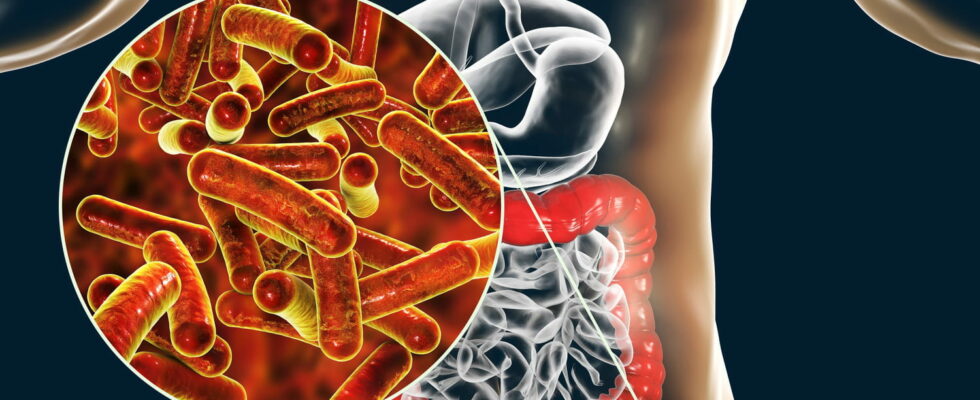Dysentery is very severe diarrhea caused by a bacterial infection, a parasite or irritating toxic products. Symptoms, causes, how to cure, is it fatal?
Dysentery is chronic or acute inflammation of the intestine due to a bacterium or a parasite most often. This is manifested by serious diarrheawhich are often tinged with blood or pus. What causes dysentery? What are the symptoms of dysentery ? How to cure it without complications? Is dysentery deadly?
Definition: what is dysentery?
“Dysentery includes the severe diarrhea caused by inflammation of the intestine, which can be due to several causes: bacteria, protozoa or irritating chemicals”, explains Doctor Romain Troalen, general practitioner in the Paris region. This diarrhea can be accompanied by traces of blood and sometimes mucus, and is potentially fatal. This symptom is more common in areas with poor sanitary conditions : “When the hygienic conditions are not good, for example the water is not clean, contaminated by bacteria, parasites, see faeces or toxic products, this will cause dysentery”, explains the doctor. This is therefore today rather rare in France.
What is amoebic dysentery?
Amoebiasis infections originate from a photosphere parasite, called Entamoeba Histolytica, which colonizes the intestinal mucosa. It is transmitted by contaminated water or stagnant water. “This infection causes painful bloody diarrhea, and can damage the intestinal wall”, explains the doctor. “It can lead to very annoying complications, for example ulcers, liver or lung abscesses…”. The doctor specifies that we don’t see much of it in France, but it is not impossible to catch this parasite.
What is bacillary dysentery?
This is a bacterial infection, which can be caused by many bacteria: the most common are salmonellosis, shigellosis (Shigella dysenteriae, Shigella flexneri or Shigella sonnei) and yersiniosis. There may also be infections Campylobacter jejuni (we see it more easily when returning from a trip) or Escherichia coli. “In much rarer cases, it may be the chlamydia which gives a syndrome called Fiessinger-Leroy-Reiter. This causes damage to the eye, urethra, joints and sometimes dysentery.” says the doctor. About 40,000 to 100,000 people die of this disease each year, according to the Pasteur Institute.
What Causes Dysentery?
Dysentery is usually caught during a traveling abroad, in a country where sanitary hygiene is poor. “In some countries, people drink water that has not passed through treatment plants, and can therefore be contaminated by feces, or even by toxic products discharged by factories”, explains the doctor. Indeed, a third cause of dysentery, rarer, but which exists, can be ‘chemical’ attacks from irritating toxic products.
What is the mode of transmission?
The mode of transmission of dysentery is said faecal-oral. The disease can be transmitted directly from person to person through contact with hands (“dirty hands disease”), or after ingesting water or food contaminated with feces.
What are the symptoms of dysentery?
- Significant diarrhea with sometimes the presence of blood
- The presence of mucus or pus in the stool
- Fever
- False needs (impressions of wanting without it being the case), or the opposite, an inability to hold back.
- Loss of appetite and weight
- Headaches
- A big tiredness
- Severe dehydration
If dysentery is suspected, the first thing to do is to find the cause. “We’re going to do a stool analysis in the laboratory, called coproculture. This is used to look for bacteria and parasites that may be present in the stool. explains Dr. Romain Troalen. So, once the cause is found, the right treatment can be given.
Who and when to consult?
In the event of a return from a trip to a country where the hygiene conditions are not optimal or even poor, and that symptoms such as those mentioned above are triggered (bloody diarrhea, fever, fatigue, weight loss, etc.), it is necessary to consult the her general practitioner sooner. The latter may thus request the samples for analysis.
The treatment for dysentery depends on the causative pathogen:
► With a pest control if the cause of dysentery is the parasite Entamoeba Histolytica
► With an antibiotic if the dysentery is caused by bacteria. The doctor will do a stool analysis to find the culprit and give the right antibiotic to stop the inflammation.
► “Of course, the biggest problem with diarrhea is dehydration.” reminds the doctor. Must therefore remember to drink water regularly to rehydrate.
Is dysentery deadly?
Dysentery, when it is very violent, can be fatal within days. “You have to be very careful, explains the doctor, some conditions can be difficult and lead to death. Normally, the body is well made and can be cured without treatment when the symptoms are not too serious, but dysentery can be fatal for fragile people who can quickly become dehydrated.he says.
Thanks to Doctor Romain Troalen, general practitioner.
